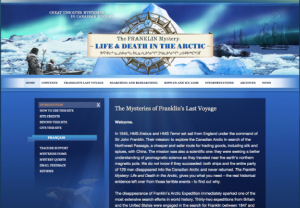General Interest
Back to Top
|
 |
|
 |
|
The Franklin Mystery: Life and Death in the Arctic
|
Social studies |
|
In 1845, two ships set out from England to explore the Canadian Arctic, locate a northern route to China, and gather geomagnetic data. Both ships and all 129 men aboard disappeared. Despite multiple rescue missions over the next dozen years, no one was ever located or saved. This site, from the University of Victoria, traces the unsolved mystery that befell the crews of HMS Erebus and HMS Terror. After perusing the gloss on the homepage, readers will want to search the various historical documents that present the fragmented story of this long ago tragedy. For instance, Franklin's Last Voyage uses a mix of historical documents and contemporary narrative to piece together the chain of events that led to the disappearance. Searching and Researching, meanwhile, unravels the mystery further through the first hand accounts of the various expeditions that went looking for the original crew. The Ripples and Ice Jams and Interpretations sections also provide rich narratives.[CNH] |
|





|
|
 |
|
Ars Technica
|
Science |
|
Founded in 1998, Ars Technica is an online tech magazine published by tech geeks, for tech geeks. It has a special emphasis on what will be interesting to IT professionals, industry insiders, and anyone with a yearning for "technology news, tech policy analysis, breakdowns of the latest scientific advancements, gadget reviews, software, hardware, and nearly everything else found in between layers of silicon." The homepage is loaded with breaking news and content, including, at the time of this writing, articles on the technological intricacies of modern recycling, France's possible ban of public Wi-Fi, and an inquiry into a tech firm that raised $3.4 million on Kickstarter and then promptly declared bankruptcy. Readers may also like to scout the main menu, which features topics such as Technology Lab, Ministry of Innovation, The Scientific Method, and other entertaining takes on the latest in technology. [CNH] |
|





|
|
 |
|
NeuroLogica Blog
|
Science |
|
Dr. Steven Novella, MD has his hands in many pots. Besides holding a position as an academic clinical neurologist at Yale University School of Medicine, he also co-founded the New England Skeptical Society, produces and hosts a weekly podcast (The Skeptics' Guide to the Universe) and writes nearly daily entries on his NeuroLogica Blog. Recent blog posts have examined the neural correlates of delayed gratification, queried the nature of irrational fears, and presented thoughts on the possibly holographic nature of the universe. Dr. Novella began blogging in 2007, and there are hundreds of entries to scout on the site. Readers may also explore the material by a number of convenient Categories, including Astronomy, Autism, Conspiracy Theories, Evolution, Education, Pseudoscience, and many others. For a skeptical look at a range of topics, the NeuroLogica Blog is a worthwhile resource. [CNH] |
|





|
|
 |
|
ArtDaily
|
Arts |
|
Founded in 1996, ArtDaily boasts the distinction of being "the first art newspaper on the net." Readers may scout the latest in contemporary and classic art in such categories as Artists, Galleries, Museums, and Photographers. The site also offers a helpful Last Week tab, which features the best of the past seven days. At the time of this writing, major events included the sale, for $13 million, of John Constable's painting The Lock, which hadn't made an appearance on the market since 1855, as well a stunning photograph of the Piazzo Duomo in Milan, and a short article on the exhibition of early 20th century painter Gerda Wegener's work in Copenhagen. Whether readers are looking for the latest in art sales, museum exhibits, or gallery presentations around the world, ArtDaily is as comprehensive as it is entertaining. [CNH] |
|





|
|
 |
|
Museum of Science, Boston: Museum Online
|
Science |
|
The Museum of Science has a threefold mission: it seeks to promote citizenship informed by science, inspire appreciation of science, and encourage young people to explore their scientific interests. The Museum Online, which is available to anyone with an Internet connection, is a major step in the direction of accomplishing those goals. Here readers will find digital exhibits, videos about the museum, online museum programs, videos that explicate STEM concepts, and various podcasts. While all of these resources are worthwhile, the Digital Exhibits are certainly worth exploring. Topics include a Firefly Watch, in which readers may participate in a university study that tracks firefly populations, and an exhibit that explains the importance of the world's oceans. [CNH] |
|





|
|
 |
|
Railroad History, An Overview of the Past
|
Social studies |
|
The history of America is, to a large extent, a history of railroads. Railroads connected the coasts, helped fashion the modern economy, and allowed for greater mobility of goods and people in the late 19th and early 20th centuries. This history of the railroads, though somewhat one-sided (no mention here of the displacement of hundreds of thousands of native people), covers a lot of ground. Fifteen short chapters take readers from the advent of the American railroads in the 1820s, through the golden age of the 1880s and 1890s, all the way up to the 1980s and onward. In addition, chapters highlight six early notable railroads in Ohio, New Jersey, New York, and South Carolina, among other locales. [CNH] |
|





|
|
 |
|
The Rockefeller Family Archives
|
Social studies |
|
This archive from the Rockefeller Archive Center "documents the careers and activities of the three generations of the Rockefeller family." Here readers will find descriptions of primary sources related to the founder of the family fortune, John D. Rockefeller (1839-1937), his son, John D. Rockefeller, Jr. (1874-1960), and his grandchildren. Special finds include an organized listing of Nelson Rockefeller's Gubernatorial papers (1959-1974) and vice presidential papers (1974-1977), as well as a listing of Abby Aldrich Rockefeller's letters to her son, Winthrop Rockefeller, while he was serving in World War II. While the primary documents are, themselves, not available on the site, the glosses of the material can be educational in and of itself. [CNH] |
|





|
|























